Soon after the organization of the Tashkent Institute of Veterinary Medicine (now the Center for the Development of Professional Qualifications of Medical Workers), in 1932, an associate professor course in dermatovenereology was established for advanced training of doctors at the Department of Skin and Venereal Diseases of the Tashkent Medical Institute. At the end of 1932, this course was transformed into the Department of Skin and Venereal Diseases of the Tashkent Institute for Advanced Training of Physicians on the basis of the Uzbek Scientific Research Institute of Dermatovenerologic Institute.
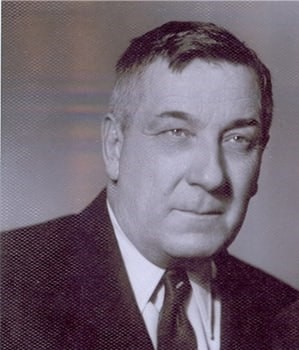
The first head of the department was Doctor of Medical Sciences, Honored Scientist of the Uzbek SSR, Professor Anatoly Ioasafovich Kartamyshev, a representative of the Kiev School of Dermatovenerologists. He was born in 1897 in Rostov-on-Don in the family of a veterinarian. In 1915 he graduated from the Voronezh gymnasium, in 1919 — from the Military Medical Academy in Leningrad. From 1920 to 1926 he worked in skin clinics in Lithuania. Czechoslovakia, Kiev. Of particular importance to him was his work at the Prague Kreibich Clinic and at the Kiev Clinic, where he wrote and defended his doctoral dissertation. Since 1930, he was elected head of the Department of Skin and Venereal Diseases of the Tashkent Medical Institute, and since 1932, at the same time, he headed the Department of Skin and Venereal Diseases of the Tashkent Institute of Veterinary Medicine. Kartamyshev A.I. owns over 150 scientific works, including more than 20 monographs and 2 textbooks. Thousands of doctors improved their skills by listening to lectures and attending his rounds. A. I. Kartamyshev's research in the field of suggestive therapy of dermatoses and cystic dermatoses has earned him fame outside our country. He, together with G.B. Belenky, was the first in the USSR to supply RIT. Under the guidance of A. I. Kartamyshev, 13 doctoral and 44 candidate's dissertations were defended.
His students headed the departments of skin and venereal diseases in Kiev, Dushanbe, Tashkent, Dnepropetrovsk, Vitebsk, Riga, Orenburg and other cities. Anatoly Ioasafovich was fluent in French, German, Spanish, Italian, Ukrainian and Lithuanian. During the war and post-war years, A. I. Kartamyshev headed the Department of Skin and Venereal Diseases at the Ufa and Kiev Medical Institutes.
From 1933 to 1938, the Department of Skin and Venereal Diseases was headed by Associate Professor Umansky G.I. Prior to his election to this position, under the guidance of A. I. Kartamyshev, he worked as a supernumerary assistant at the Department of Skin and Venereal Diseases of the Tashkent Medical Institute, where he received the title of Associate Professor. At the Department of Dermatovenereology of the Tashkent Institute of Veterinary Medicine, under his leadership, the first training programs were created for the improvement of dermatovenerologists on the most pressing problems of dermatology and venereology, taking into account the ecological situation of the area and the epidemiological situation. In the 30s years of the XX century, the teaching staff of the department together with the staff of the Uzbek Research Institute of Dermatology and Venereology carried out active work in the regions, cities and districts of the republic, expeditionary teams were annually sent to the most remote regions to combat fungal and venereal diseases. The monograph by G.I. Umansky presents histopathological studies of the skin in young children.
Since 1938, the Department of Skin and Venereal Diseases was headed by Professor A.S. Zelmanovich (1891–1956). He was the first assistant of the Department of Skin and Venereal Diseases of the Tashkent Medical Institute, worked under the guidance of such prominent scientists and practitioners in dermatovenereology as I.S. Milman, A.I. Kartamyshev and others. by developing thematic and cyclic programs, as well as programs specializing in dermatovenereology. In those years, A.S. Zelmanovich simultaneously worked as Deputy Director for Scientific Work at the Uzbek Research Institute of Dermatology and Venereology. The teaching staff of the department together with the staff of this institute conducted a number of scientific studies in the field of syphilidology. They studied metabolic processes in experimental animals, the features of the course of syphilis in a hot climate, the etiopathogenetic mechanisms of the development of pyoderma, fungal diseases, and proposed original methods of treatment; A lot of scientific work has been done on the problems of occupational skin diseases at industrial enterprises and in agriculture. The monograph (1948) by A.S. Zelmanovich is devoted to the clinical and experimental study of kidney damage by the therapeutic drug "Bismuth". A.S. Zelmanovich worked as the head of the department until 1952.
From 1952 to 1953, the Department of Dermatology and Venereology of the Tashkent Institute of Veterinary Medicine was headed by Vladimir Isidorovich Feldman. V. I. Feldman paid great attention to the diagnosis and treatment of acquired and congenital syphilis, chancre, the role of trauma in the occurrence of pyoderma, microbial eczema, streptococci in skin pathology. He is the author of more than 40 scientific works on the main issues of dermatology and venereology, monographs and textbooks ("Early Congenital Syphilis", "Treatment of skin and venereal diseases"), he described in detail such rare dermatoses as Randu Osler-Weber disease, Norwegian scabies, etc.
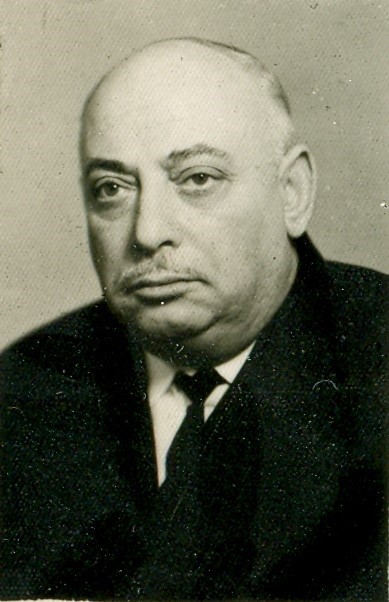
In 1953, Doctor of Medical Sciences, Professor Isidor Abramovich Telishevsky was elected Head of the Department of Skin and Venereal Diseases of the Tashkent Institute of Veterinary Medicine. He was born in 1910 in Tashkent, in 1933 he graduated from the Tashkent Medical Institute, entered the postgraduate course at the Department of Dermatovenereology, and then worked as a junior researcher at the Uzbek Research Institute of Dermatology and Venereology. From 1941 to 1947, I.A. Telishevsky headed this institute. Department of Dermatovenereology of the Tashkent Institute of Military Education, he worked as an assistant, associate professor, and since 1953 - as the head of the department. Professor I. A. Telishevsky is the author of about 100 scientific works, including monographs, textbooks, clinical, clinical, experimental, organizational and methodological works. Under his leadership, 12 candidates of medical sciences were trained. The reference book (atlas) published by I.A. Telishevsky and V.V. Shuvalov includes a description of the clinic, etiology, pathogenesis, prevention and treatment of most of both common and rare skin diseases. Special sections of the handbook provide data on dermatoses observed in wartime, and skin lesions that are possible in special conditions. Qualified specialists took part in the work on these sections. The handbook is richly illustrated, which makes it possible for both general practitioners and dermatologists to familiarize themselves in detail with the clinical picture of dermatoses. From 1950 to 1963, I.A. Telishevsky studied balneotherapy of dermatoses with mineral waters of the Chartak resort. He and his students conducted clinical, experimental and functional studies. For many years of fruitful pedagogical activity and merits in the development of medical science, I.A. Teleshevsky was awarded the honorary title "Honored Scientist of the Uzbek SSR".
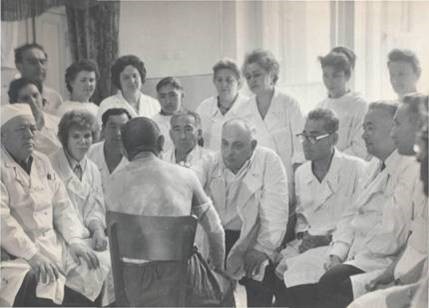
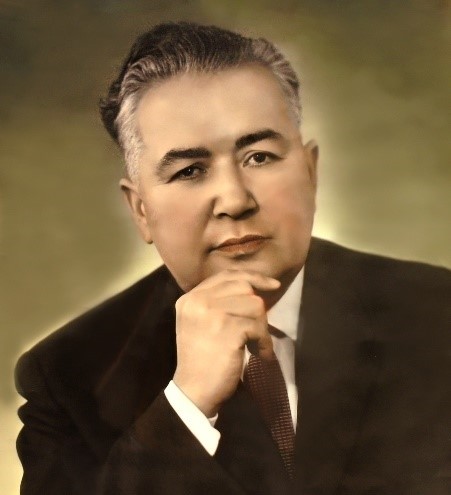
In 1976, Candidate of Medical Sciences, Associate Professor Hamidulla Khusanovich Khusanov was elected Head of the Department of Skin and Venereal Diseases. He was born on April 14, 1919 in Tashkent. In 1940 he graduated from the Tashkent State Medical Institute. From 1940 to 1941 he worked as a pediatrician and chief physician of the children's polyclinic No. 7 in the city of Tashkent. From 1941 to 1945 he participated in the Second World War. From 1946 to 1947 he worked as the chief physician of the clinical hospital No7. from 1947 to 1950 he studied in clinical residency at the Uzbek Research Institute of Dermatology and Venereology, from 1950 to 1953 he was a researcher at this institute. From 1953 to 1961 he worked as an assistant, and since 1961 - as an associate professor of the Department of Dermatology and Venereology of the Tashkent Institute of Veterinary Medicine. In 1958 he defended his Ph.D. thesis on the topic "Histological changes in skin syphilides in syphilis patients treated with ecmonococillin". From 1966 to 1979 he worked as the rector of the Tashkent Institute for the Improvement of Doctors and at the same time as an associate professor of the department. He is the author of about 100 scientific works, including 7 monographs, he owns the first and only monograph on cosmetology in Uzbekistan. He is an active participant in various scientific forums, symposia, conferences, congresses. Kh.Kh. Khusanov was awarded the Order of the Patriotic War II degree, the Order of the Red Star, the Badge of Honor, medals "For the Defense of Stalingrad", "For the Capture of Budapest", "For the Liberation of Prague", "For the Victory over Germany", "For Labor Distinction", certificates of honor of the Supreme Council of the Uzbek SSR.
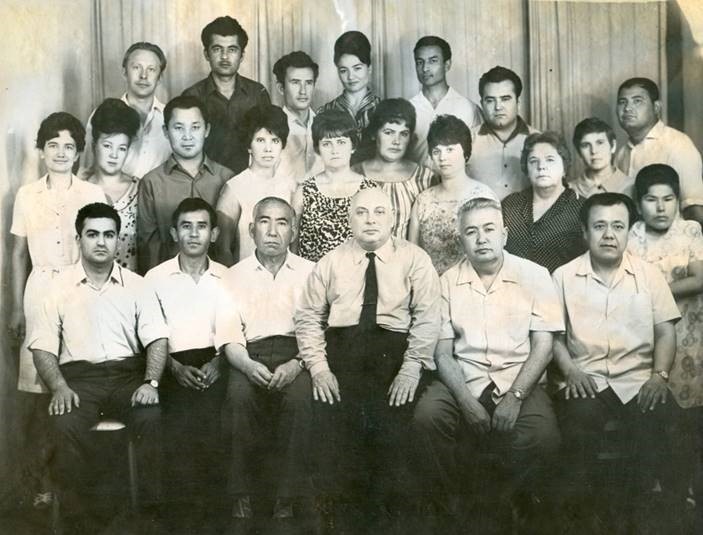
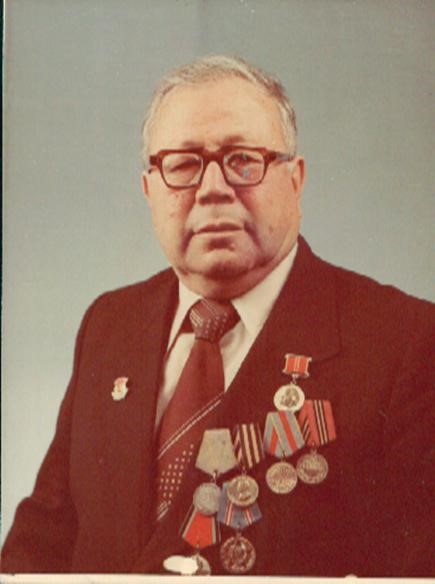
From 1977 to 1988, the Department of Skin and Venereal Diseases was headed by Professor Abdulkhay Khojaevich Abdullayev. He was born on May 4, 1921 in Tashkent. In 1937, he entered the Tashkent State Medical Institute. After graduating from the institute, the labor and military biography of Abdulkhay Khodjaevich began: on August 23, 1942, three days after receiving a doctor's diploma, he and his comrades voluntarily went to the front. liberation of
Poland, during the crossing of the Oder River and the capture of Berlin, for which he was awarded medals "For Military Merit", "For the Liberation of Warsaw", "For the Capture of Berlin" and other awards. From 1946 to 1952, Abdullaev A.Kh. worked as a resident doctor, head of the department, then deputy chief physician of the city hospital No7, and in 1952 he was enrolled by competition for the position of junior researcher at the Uzbek Research Institute of Skin and Venereal Diseases. Abdullaev A.Kh. In-depth research work on topical issues of dermatovenereology has been carried out. His Ph.D. (1959) and doctoral (1975) dissertations are devoted to the study of epidemiology, pathogenesis, immunology, clinic, methods of diagnosis and treatment of syphilis. From 1959 to 1976, Abdulkhay Khojaevich headed the venereological department, from 1964 to 1968 he acted as deputy director for science of the Uzbek Research Institute of Dermatology and Venereology, since 1976 he worked as an associate professor, and since January 1978 he headed the Department of Dermatovenereology of the Tashkent Institute of Dermatology and Venereology. Under his leadership, more than 40 clinical residents, 7 candidates of medical sciences have been trained, he owns more than 100 scientific articles published in foreign and domestic press, dozens of popular science brochures, methodological recommendations on topical issues of dermatovenereology, as well as translations of articles and textbooks into Uzbek. Abdulkhay Khodjaevich conducted a lot of scientific and social work. For many years, he was the secretary of the Tashkent and Republican Scientific Society of Dermatovenereologists, a member of the board of the Republican Scientific Society of Dermatovenereologists, a member of the Academic Council of the Faculty of Therapy of the Tashkent Institute of Veterinary Medicine, a member of the editorial board of the journal "Bulletin of Dermatology and Venereology". A.Kh. Abdullaev has repeatedly represented Uzbek dermatological science at the republican and All-Union congresses of dermatologists of Russia, Ukraine, and Kazakhstan. The government highly appreciated the merits of Abdulkhay Khodjaevich: he was awarded many awards, the medal "For Valorous Labor", the Certificate of Honor of the Presidium of the Supreme Soviet, the badge "Excellent Worker of Healthcare".
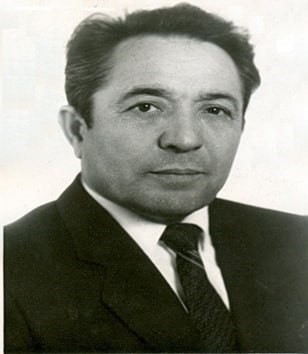
From 1989 to 1993 the Department was headed by Khudaiberdiyev Nigmat
Akhmedovich. He was born in 1940, in 1969 he graduated from the Faculty of Medicine of the Tashkent Medical Institute. In 1975 he defended his candidate's dissertation, in 1990 – his doctoral dissertation. His scientific works are devoted to the pathogenesis, clinical course and treatment of syphilis, as well as the role of sexually transmitted infections in the formation of infertility Avlod Uchun" to provide treatment, diagnostic and preventive care to patients with reproductive disorders caused by sexually transmitted infections. He is the author of a large number of scientific articles. His students work in various medical and preventive institutions of our country.
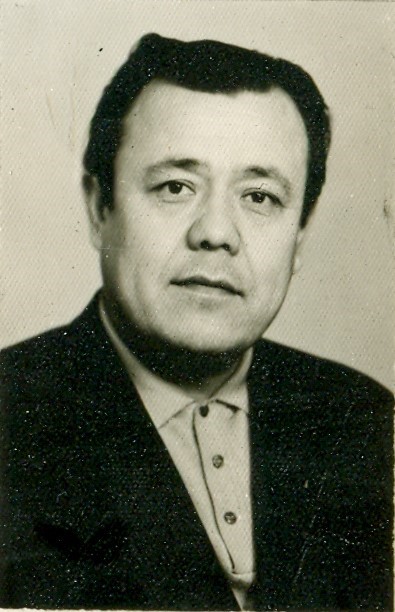
From 1993 to 1994, the Department was headed by Candidate of Medical Sciences, Associate Professor Abid Salikhovich Salikhov. He was born on March 8, 1927 in Tashkent. After graduating from the Medical Institute, from 1948 to 1950 he worked as the head of the Biy-Bazar IED, from 1950 to 1953 - the chief physician of the Republican Dermatovenerologic Dispensary of the Ministry of Health of the Karakalpak Autonomous Republic, from 1953 to 1957 - a resident of the Uzbek Research Dermatovenerologic Institute. In the 50s, Associate Professor Salikhov devoted a number of his scientific works to the issues of combating occupational dermatoses, having studied pustular skin diseases common among cotton growers. From 1957 to 1960, he was a postgraduate student of the Department of Dermatology and Venereology of the Tashkent Institute of Veterinary Medicine with secondment to the Moscow Central Institute of Higher Education. After graduating from graduate school in 1960, he was elected to the position of assistant at the Department of Dermatology and Venereology of the Tashkent Institute of Veterinary Medicine. In 1961, he successfully defended his Ph.D. thesis "Materials for the Characteristics of the Functional State of the Adrenal Cortex in Patients with Psoriasis", proving that in patients with severe psoriasis, the reserve capabilities of the adrenal cortex are sharply suppressed. In 1968, A.S. Salikhov was elected to the position of Associate Professor of the Department of Dermatology and Venereology of the Tashkent Institute of Veterinary Medicine, where he worked until 2000. He was awarded the badge "Excellent Worker of Healthcare", as well as a number of certificates of honor of the regions of the republic.
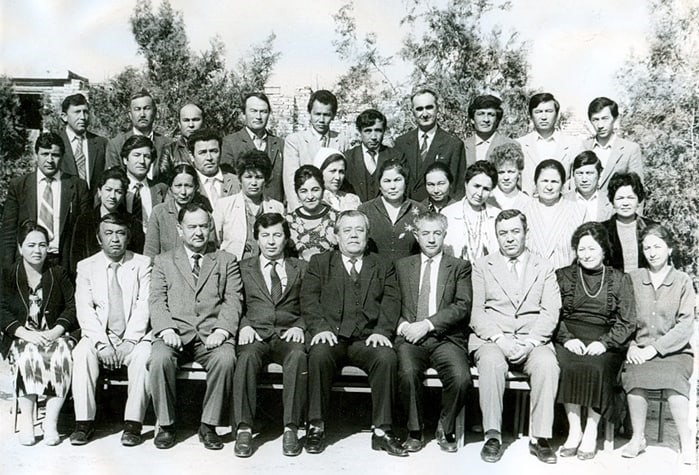
From 1994 to 1998 the Department was headed by Candidate of Medical Sciences, Associate Professor Javlon Rakhimberdievich Karimberdiev. He was born on August 21, 1951 in Tashkent. In 1974 he graduated from the Tashkent State Medical Institute. From 1974 to 1976 he worked as a doctor, then as the head of the clinic department of the Uzbek Research Institute of Dermatology and Venereology. From 1976 to 1979 he was a senior laboratory assistant, 1979 - Assistant, and from 1994 to the present - Associate Professor of the Department of Dermatology and Venereology. In 1990, he defended his Ph.D. thesis "Ultrastructural changes in the skin in lupus erythematosus". Under his leadership, more than 100 clinical residents were trained, who work in various medical and preventive institutions not only in our republic, but also in the CIS countries. He is the author of about 60 scientific articles, including 1 monograph, 4 methodological recommendations; member of the Republican and City Society of Dermatovenerologists. He has repeatedly participated in international congresses abroad, at congresses of dermatovenerologists of Uzbekistan. The results of his scientific research are applied in the educational process of advanced training of doctors in practical health care (in the diagnosis, treatment and prevention of collagen diseases, rare dermatoses, etc.).
Usmonov Tokhta Usmonovich worked as an assistant of the department from 1971 to 2008. In 1971 he defended his Ph.D. thesis in the specialty "Skin and venereal diseases". He conducted scientific research in the field of venereology, in particular, the monograph describes in detail the epidemiology and historical aspects of the development of syphilis in Uzbekistan. T.U. Usmonov repeatedly traveled to the regions of the Republic for advanced training of doctors and consulted dermatovenereological patients.
His students work in various regions of the Republic and the CIS countries.
Postgraduate student of the department Kilychev R.M. in his Ph.D. thesis "Materials for the Characteristics of the Modern Clinical Course of Syphilis and the State of the Nervous System in Patients with Its Contagious Forms" he presented data on the clinical course of syphilis in the past and present.
Postgraduate student of the department Khamidov Shavvaz Akhmedovich in his Ph.D. thesis "Materials for studying the therapy of patients with infectious forms of syphilis with bicillin-5" (clinical and laboratory studies) presented the results of observation of patients with syphilis treated with bicillin-5.
Over the years, such experienced employees as Associate Professor Khidirov Kh.N., assistants Ilyasov B.I., Mirsaatov M.U., Alieva S.G., Desyatchikova A.V., Alimov Kh.A., Abidova Z.M., Nasretdinov I., senior laboratory assistants Abdumalikov R., Kuchkarov U., Nabiev T.A., Kazakbaev F. worked at the Department of Dermatology and Venereology.

